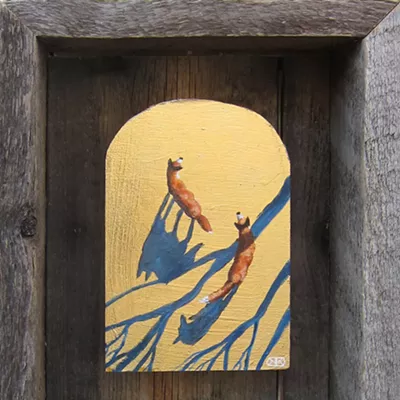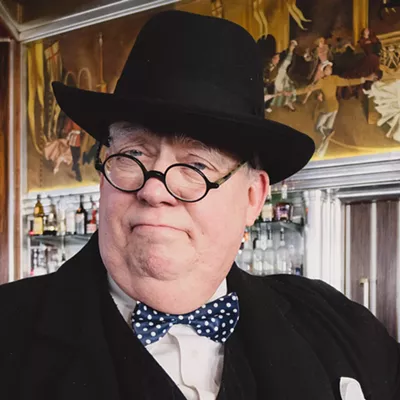A Night of Social Dances
20TH ANNUAL WAILA FESTIVAL5 TO 11 P.M., SATURDAY, MAY 31
UA BEAR DOWN FIELD
CHERRY AVENUE AND FOURTH STREET
628-5774; arizonahistoricalsociety.org
The Arizona Historical Society's 20th Annual Waila Festival takes place this Saturday. Waila is both a type of music similar to polka and a Tohono O'odham social dance.
Waila music began in the early 1800s, when missionaries wanted native musicians to play during church services. They taught local musicians to play fiddles, says Angelo Joaquin Jr., a festival co-founder. The musicians then began playing secular music, influenced by polkas and other European styles. They also absorbed influences from cumbia dances from Columbia in the '40s and '50s. These origins make Waila a bit different from other American Indian dances.
The fact that Waila is a more recent creation aided its adaption of different, European influences. This sort of transformation is common in American Indian cultures, says Joaquin.
"If you look at any Indian culture, there has been tremendous pressure on them to change, to assimilate. In some cases, things are forced upon them. They simply take (what's being forced upon them) and change it so it meets the values of the culture. That's when you have a successful transformation."
As a social dance, Waila has a celebratory purpose, says Joaquin. As a part of that celebratory nature, all people are encouraged to participate in the event.
"What sets us apart from other events is that there is much more of a community-building aspect to the Waila Festival. You're bringing the dominant culture, which is people who just got here, and the culture which has been here the longest together, and using music to soften the difference."
Traditional Tohono O'odham food will be served, including cholla buds, tepary beans, corn soup and squash dishes. The festival is free; it takes place on open grass, so bring a blanket or lawn furniture. --J.G.
A New Version of a Forgotten River Phoenix Film
AREN'T YOU EVEN GONNA KISS ME GOODBYE?7:30 P.M., FRIDAY, MAY 30
LOFT CINEMA
3233 E SPEEDWAY BLVD.
795-0844; loftcinema.com
A director saying that a studio ruined his film is nothing new. A director saying that and then releasing a revamped version of the film 20 years later is fairly unique.
A Night in the Life of Jimmy Reardon was originally released in 1988, starring River Phoenix in the title role. This Friday, the Loft is showing Aren't You Even Gonna Kiss Me Goodbye?, the director's cut of the film. It will be hosted by that director, William Richert, and Meredith Salenger, one of the actors.
Richert wrote the book on which the film is based, a semi-autobiographic novel published while he was still in his 20s touching on his experiences growing up in Chicago in the 1960s. He says he waited 20 years for the right independent studio to come along before he made the film--only to watch the studio file for bankruptcy. Fox wound up getting its hands on the film, which led to many changes.
"I deeply resented at the time my inability to fight the legal machinery and the intentions of a major studio, who were saying things like, 'Your movie doesn't play well with audiences.'"
Aren't You Even Gonna Kiss Me Goodbye? includes an original soundtrack by Elmer Bernstein, an opening song by Johnny Mathis, narration by Richert and restored scenes. In the original 1988 release, the Bernstein score was replaced by established '60s music; the Mathis song was taken out of the film; and Richert's narration was replaced with narration by Phoenix. Richert was particularly displeased with the narration change.
"The whole point of the movie, one aspect of it, was an older guy looking back on a misspent youth and seeing all the nuggets in it."
Tickets are $8.50 general admission, with discounts available. --J.G.
Sharks V. Jets
"WEST SIDE STORY," PRODUCED BY REDONDO MUSIC THEATRE7:30 P.M., FRIDAY, MAY 30,AND SATURDAY, MAY 31; 2 P.M., SUNDAY, JUNE 1
TCC LEO RICH THEATRE
260 S. CHURCH AVE.
615-1130
Redondo Music Theatre is closing its first full season of musicals with an abbreviated run of West Side Story this weekend.
One interesting aspect of this production will be the attempt at a timeless appearance. Instead of the traditional 1950s wardrobe, director Hal Hundley is using a generic wardrobe for this tale of gang warfare and young love.
"Gangs are gangs are gangs. I'm not specifying a time period. Their wardrobe will be generic enough that the audience will say, 'Is this now? Is this 20 years ago, 30 years ago?'"
Hundley says that modern musicals are too focused on flashy production values instead of strong music and performances; this has led him to focus more on classic musicals.
"These new composers don't know how to write music. They don't know how to write stories. It's all just: How much glitz can we put on that stage to divert the action from the audience?"
This distaste for recent productions has helped to form the aesthetic for Redondo's productions. Hundley uses minimal set pieces in productions and no scenery. Hundley says audiences have responded favorably to the lack of frills.
"They know where they are in the story all the time, because the actors and the story are so good. Those are the things that make a show an important piece, whether it's West Side Story or any of the other classics."
Tickets for the musical are $20 to $24, and can be purchased through Ticketmaster or at the TCC box office. --J.G.
Two Looks at One Era
AN EVENING WITH AUTHORS TONY HORWITZ AND RICHARD FLINT5:30 TO 7:30 P.M., SATURDAY, MAY 31
TUCSON BOTANICAL GARDENS PORTER HALL
2150 N. ALVERNON WAY
882-6946; cdarc.org
Two different ways of exploring history will be on display at the Tucson Botanical Gardens this Saturday, when two authors discuss the different approaches they took in looking into a specific period.
In A Voyage Long and Strange: Rediscovering the New World, Tony Horwitz combines a travelogue with his look into the period of history between Columbus' voyage and the landing of the Pilgrims at Plymouth Rock.
As a part of his research, Horwitz stayed with author Richard Flint and his wife, experts on Spanish conquistador Francisco Vázquez de Coronado. According to Flint, Horwitz is interested in exploring what both experts and regular people know, or think they know, about history.
"Bars are a frequent source of his information. He tends to run into people who are certainly not specialists, but they have opinions, they have ideas about the subject. They sometimes are very revealing about the state of our society at large, and I think that's what Tony really likes about it."
Richard Flint's new book, No Settlement, No Conquest: A History of the Coronado Entrada, is an in-depth look into a similar era, with a more traditional, historical perspective.
"I think our histories differ in the sense that Tony is, not solely, but most importantly, interested in how the past is perceived now," says Flint. "Our focus is much more on those past events, trying to unravel them, to get a close look at what actually happened and why it happened. I view the two books as very much complimentary."
Both writers will be at the gardens this Saturday. The event is free to the public, and both books will be for sale at the event. --J.G.







